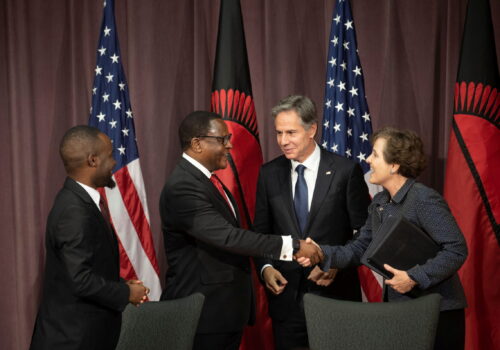The United States needs to pay more attention to the digital identity economy.
In my work researching how African diaspora communities in the United States maintain their connections to their homelands, I have found that long-standing experiences involving racism, combined with growing anti-immigrant sentiments, have led many members of the African diaspora to strengthen their ties to the continent.
Such diasporans, especially second-generation diasporans (that is, the children of immigrants), have connected with their African identities by turning to the digital space, which has enabled them to follow Africa-related news and cultural trends, connect with diaspora organizations, and keep in touch with family and friends. Digital platforms reduce the distance between home and abroad, accelerating the movement of people, capital, and ideas.
Second-generation diasporans have also turned to digital platforms to engage in cultural commerce. This digitized and culturally rooted economic engagement—which includes business development, trade, and investment—is what I call the digital identity economy. And this type of diaspora engagement offers new opportunities for reshaping US relations with the African continent.
Diaspora engagement is nothing new; African diaspora communities have long maintained economic, cultural, and social connections to their countries of origin. African immigrants in the 1970s and 1980s maintained homeland ties by opening cultural shops for food products, sending remittances, forming associations and religious institutions, and visiting home.
But the digital identity economy has created space for second-generation diasporans to channel their shared desire to connect with their homelands, offering products and services that meet their cultural needs while addressing the distinct challenges they face in reconnecting with home, challenges that first-generation immigrants may not experience in the same way. For example, one app called Nkenne, created by a second-generation Nigerian-American, helps diasporans learn African languages and addresses declining heritage-language fluency, a common issue for second-generation diasporans. The app provides cultural education about customs in African countries that younger diasporans may not be familiar with, helping them feel more connected to their culture and their identity from afar.
Digital platforms such as Spotify and YouTube enable young diasporans to engage with African music, stream artists’ work, and share their content. The popularity of Afrobeats music has given rise to businesses and events centered around the genre, including parties and popular music festivals—such as Afrofuture and Afronation—which take place not only in African countries but also in diaspora communities. While some may view these events solely as entertainment, they reflect deep cultural connections that create economic activity.
The digital identity economy has created economic opportunities in tourism for second-generation diasporans. For example, acclaimed second-generation Ghanaian-American chef Eric Adjepong offers a Ghanaian culinary tour, using digital platforms for promotion and booking. And the digital identity economy has enabled second-generation diasporans to use fashion to express their cultural pride and identity. The brand Ashanti Beads, which creates apparel featuring the Akan Adinkra symbol Gye Nyame, is an example of this. Its tagline, “Bridging the gap in the African diaspora through fashion,” speaks to the growing demand for culturally rooted apparel. Ashanti Beads uses digital platforms to engage its audience, market its brand, and sell its products.
These culturally rooted economic activities reflect the financial engagement patterns of second-generation African diaspora members. In speaking with second-generation Ghanaians in the United States and United Kingdom, I found that they are not sending traditional remittances at the same rate as the first generation and are also less likely to send remittances in the future. Reasons for this included not wanting to be taken advantage of financially, not having anyone to send money to, and fears around creating a cycle of dependency. They preferred practices that would promote widespread economic improvement, such as business development, investing, and collective remittances.
Some view the lack of interest in sending remittances among young African diasporans to be a challenge, especially with cuts to foreign aid, tariffs threatening the future of the African Growth and Opportunity Act (AGOA), and the end of Prosper Africa. While some have argued that remittances could fill that funding gap (in 2023, the African continent received over ninety billion dollars in remittances, significantly surpassing foreign aid and foreign direct investment), this is not realistic. Remittances are primarily used for consumption, immigrants face increasing financial difficulty in part due to restrictive immigration policies, and younger diasporans are less likely to send such funds.
These shifts are seen by some as a threat to Africa’s development, but they really present an opportunity to reimagine US-Africa engagement. Washington can introduce new policies and initiatives that support diaspora investment, trade, and business development as an alternative to development aid. And it is in the United States’ interest to do so: Supporting the digital identity economy would yield growth for diaspora businesses and communities in the country.
One way to do that is by strengthening ties through American Chambers of Commerce. American Chambers of Commerce on the African continent can serve as connectors and champions for a new era of diaspora-driven trade. By supporting business matchmaking, policy reform, and transnational partnerships, they offer a ready-made infrastructure for unlocking the potential of the digital identity economy.
Another is by creating a post-AGOA US-Africa trade policy. A policy that centers on diaspora businesses and entrepreneurs—by offering concessions and incentives that reward investment in the continent’s creative, cultural, and digital sectors—would support the growth of African economies and diaspora businesses.
A third initiative could include redefining foreign direct investment (FDI) to include diaspora investment. US diaspora businesses investing in Africa should be recognized as a form of FDI. While diaspora direct investment may be harder to track than remittances or traditional FDI, it still offers a dual benefit by supporting Africa’s growth while strengthening diaspora businesses in the United States. Redefining FDI to include diaspora direct investment would provide a more accurate depiction of capital outflows and the actors driving them. It can also broaden how the United States views diaspora financial contributions, moving beyond a focus on remittances to acknowledge the businesses, services, and networks they provide.
By embracing the digital identity economy, fostering diaspora investment, and rethinking trade policies, the United States can adopt a collaborative approach that supports African economic empowerment while strengthening connections across the diaspora, encouraging mutual growth.
Kirstie Kwarteng is a postdoctoral research associate at SOAS University of London and founder of The Nana Project.
Further reading
Mon, Sep 23, 2024
How protecting intellectual property rights in African music, film, and fashion can create opportunity and wealth
Report By
The creative industry has the potential to transform the African continent through economic growth and narrative change. As the demand for African innovations continues to increase, so will the need for the protection of creators.
Tue, Jul 16, 2024
It’s time to invest in the African creatives shaping global trends
AfricaSource By
African governments, their international partners, and investors can do more to ignite Africa’s creative industries.
Thu, Apr 24, 2025
The Millennium Challenge Corporation could prove essential in the race for critical minerals. Reform it, don’t shut it down.
Issue Brief By Aubrey Hruby
As the Trump administration aligns foreign aid with core strategic interests, the MCC represents an underutilized asset.
Image: Photographer Alexander Ashimole is seen during a photoshoot with fashion model Reta Jerry-Riman as they create campaign images to contribute to the social media challenge called the 'Vogue Africa Challenge' at a studio in Lagos, Nigeria on June 25, 2020. Photo via REUTERS/Temilade Adelaja.




